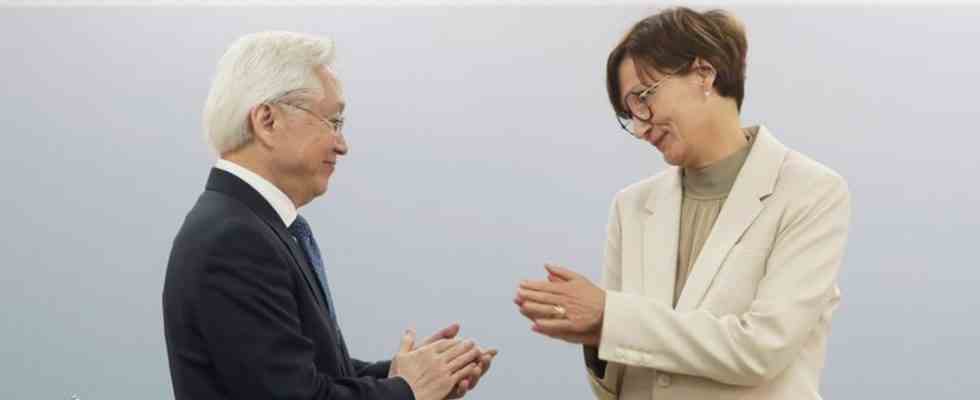Bettina Stark-Watzinger
Federal minister upsets China with tech trip to Taiwan
Federal Education Minister Bettina Stark-Watzinger meets her Taiwanese counterpart Tsung-Tsong Wu in Taipei. photo
© ChiangYing-ying/AP
For the first time in a quarter of a century, a German ministerial visit is coming to Taiwan. A huge issue for the island state against the background of tensions with China. Beijing reacted with sharp words.
China has sharply criticized the first German ministerial visit to Taiwan in 26 years. Foreign Ministry spokesman Wang Wenbin described the trip by Federal Education Minister Bettina Stark-Watzinger as a “monstrous act”.
The FDP politician arrived in the capital Taipei in the morning. No German minister had visited the island republic since 1997. In Taiwan, Stark-Watzinger’s trip was described as a “historic event” and was one of the top topics on Tuesday.
Great reception for Stark-Watzinger
When Bettina Stark-Watzinger arrives at Taipei Airport on Tuesday morning local time after a scheduled flight of more than 12 hours, the first cameras are already waiting. The media rush later at the most important item on the agenda, a meeting between Stark-Watzinger and the Taiwanese Minister of Science, Tsung-Tsong Wu, seems as if Chancellor Olaf Scholz (SPD) had announced his arrival.
In the presence of the German minister and her counterpart, representatives of Germany and Taiwan sign an agreement on broad-based cooperation in science and technology. The FDP politician then praised Taiwan as a “value partner”, also with a view to research, pointing to academic freedom and transparency.
Beijing responds with “strong disapproval”
The reaction from Beijing was not long in coming and was harsh: China had lodged a protest with the German side and expressed its “sharp disapproval”. The ministry spokesman called on the federal government to adhere to the so-called one-China principle and “stop interacting with Taiwan’s separatist forces and sending them the wrong signals immediately.”
Like most countries, Germany does not maintain diplomatic relations with Taiwan. China, which considers the island part of the People’s Republic, would not accept this. Taiwan, on the other hand, has long considered itself independent. Beijing ultimately threatens conquest if “reunification” cannot be achieved otherwise. Against this background, the highest-ranking German visit to Taiwan for almost three decades also has symbolic power.
Stark-Watzinger: “professional visit”
Taiwan’s Minister of Science, Wu, spoke of a “historic event” at the meeting with Stark-Watzinger on Tuesday. The visit is greatly appreciated. It is completely normal for those responsible in two countries to exchange ideas. And as a free and democratic country, Taiwan will continue to exercise this right.
Stark-Watzinger calls it a great “joy and honor” to be the first female minister to visit Taiwan in 26 years. She does not respond to repeated questions about China and the reactions from Beijing. Instead, the FDP politician repeatedly emphasizes that the visit is about a “professional exchange”. She is there to deepen research topics. “That is the purpose of this trip.”
Stressed non-political visit program
Consequently, the program of visits is deliberately kept non-political. According to the official plan, the FDP politician will meet representatives from science, research, education and government representatives from this field on her two-day trip, but not politicians such as Foreign Minister Joseph Wu or President Tsai Ing-wen. Topics include collaboration in battery research, so-called green hydrogen and semiconductor research. Taiwan is one of the world’s most important semiconductor manufacturers.
However, this cannot be completely separated from world politics. The Federal Ministry of Education had announced before the trip that it was also “part of the diversification of international partnerships (…) with like-minded countries in global scientific cooperation”. Or as the Taiwanese representative in Berlin, Shieh Jhy-Wey, puts it in Taipei: If you become too dependent on the Chinese economy or technology, then you cut yourself in the flesh.

